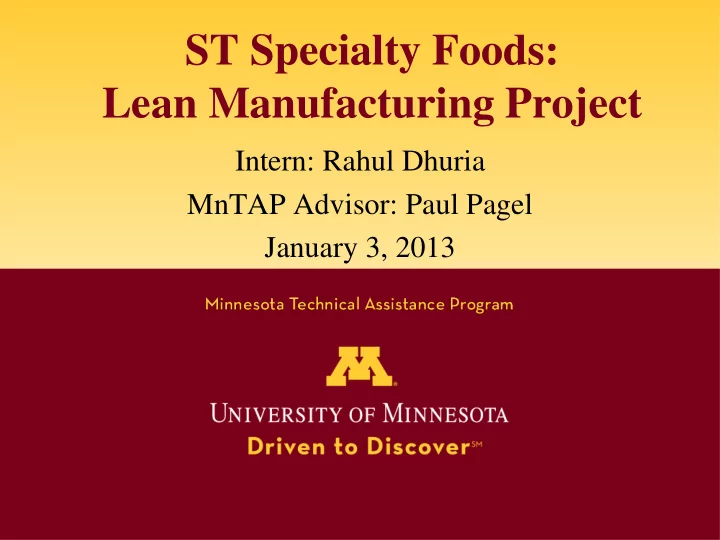

ST Specialty Foods: Lean Manufacturing Project Intern: Rahul Dhuria MnTAP Advisor: Paul Pagel January 3, 2013
Agenda • Background – Personal Background – Company Overview • Motivation for Change • Approach and Methods • Project Focus • Summary and Conclusions • Lessons Learned
Personal Background • Previous Work Experience – Cummins, Summer 2013 (Industrial Engineering Intern) – Accenture, 2008-2011 (Consulting Analyst) • Attended University of MN – Twin Cities – Master’s of Industrial Engineering (Dec 2013) • Focused on human factors/ergonomics and supply chain/operations management – Bachelor’s of Chemical Engineering (May 2007)
Company Overview • ST Specialty Foods: manufacturer of pasta/rice products – Acquired in October 2010 • Parent Company (Treehouse Foods) is one of largest private label and foodservice companies
Company Overview • Located in Brooklyn Park, MN and in Kenosha, WI – Brooklyn Park: 3.24 acres ‐ 75,450 square foot building • 3 pasta production lines ‐ 8 packaging lines • Approximately 469 SKUs (30 Pasta & 3 Rice types)
Motivations for Change • The ST Specialty Foods management team is striving to implement a lean manufacturing program – Currently in early stages of lean journey • Changeovers lead to excessive downtime • Material loss due to process inefficiency
Approach and Methods • Used methods engineering tools to gather and analyze data – Observations (i.e. walkthroughs) – Interviews (spoke with operators/mechanics) • Identified problem areas and potential projects – Worked with production manager and supervisors – Focused on areas from company’s Pareto Analysis • Analyzed information and proposed solutions
Project Focus • Two main project areas: – Franklin Energy Audit Recommendations – Lean Manufacturing Projects • Goal: Improve efficiency and reduce energy – 5S initiatives – Setup time reduction – Process improvement
Project Focus: Franklin Energy Audit • Equipment Inefficiencies – Compressors – Motors • Implement Exterior Lighting project
Successful Process Changes • Compressor Maintenance – Equipment Install (Zero Loss Air Drain, Mist Eliminator – Compressed Air Leak Study
Project Focus: Lean Manufacturing Operations • Excessive Downtime due to: – Frequent changeovers (Individual changeovers vary considerably, ~30-180 min) – Insufficient tools/equipment – Lack of standard process for machine setup • Negative affect on plant overall efficiency • Implement 5S system and standardize procedures and tools
Successful Process Changes • 5S System Implemented – Checklist for Cleaning and Changeovers – Shadow Boards Installed – Standard Operating Procedures – Centerlining on Case Packers
Successful Process Changes • 5S System Implemented – Checklist for Cleaning and Changeovers – Shadow Boards Installed – Standard Operating Procedures – Centerlining on Case Packers
Successful Process Changes • 5S System Implemented – Checklist for Cleaning and Changeovers – Shadow Boards Installed – Standard Operating Procedures – Centerlining on Case Packers
Successful Process Changes • 5S System Implemented – Checklist for Cleaning and Changeovers – Shadow Boards Installed – Standard Operating Procedures – Centerlining on Case Packers
Successful Process Changes • 5S System Implemented – Checklist for Cleaning and Changeovers – Shadow Boards Installed – Standard Operating Procedures – Centerlining on Case Packers
Summary • Project Summary: Waste/Energy Net Savings Recommendation Reduced Implementation Cost Payback Period Status (Yearly) (Yearly) Completed Exterior Lighting Upgrade 10,731 kWh $8,190 $972 7.4 years (Nov 2013) Air Compressor Completed 18,030 kWh $7,190 $1,622 1.32 years* Maintenance (Dec 2013) Air Leak Study ~33.1 CFM $3,827 ----- In Progress ----- Lean Operations/5S In Progress ~20 min/shift $8,514 $14,280 0.60 years** Initiatives (Ongoing) *Inclusive of total air compressor upgrade and leak study **Estimated based on 20 minutes saved/line per shift and $63/hour (total cost), 340 operating days
Conclusions • Plant goal is Goal at 72% overall efficiency next year, up from 69% in 2013 • Increased efficiency by 1-2% based on estimated saving by implementing reduced changeover time 75% Overall Efficiency 71% 70% 70% 70% 68% 68% 68% 68% 67% 66% 66% 65% 64% 60% Jan Feb Mar Apr May Jun Jul Aug Sept Oct Nov
Conclusions • Company is early in lean operations journey – Support from Plant Leadership and overall corporate team is promising • Need to build more accountability and ownership among the operators • Many quick wins realized in short term • Recommendations left for future projects
Lessons Learned • Real life industrial environment exposure • Energy-related projects in manufacturing operations • Operator and 3 rd Party Vendor Relationship Management • Technical understanding with food manufacturer (R&D, pasta/rice) • Opportunity to spend time on production floor
Questions?
Recommend
More recommend